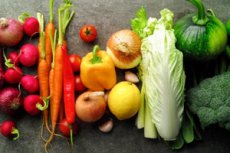New publications
A plant-based diet has been proven to be effective in controlling hypertension
Last reviewed: 02.07.2025

All iLive content is medically reviewed or fact checked to ensure as much factual accuracy as possible.
We have strict sourcing guidelines and only link to reputable media sites, academic research institutions and, whenever possible, medically peer reviewed studies. Note that the numbers in parentheses ([1], [2], etc.) are clickable links to these studies.
If you feel that any of our content is inaccurate, out-of-date, or otherwise questionable, please select it and press Ctrl + Enter.

Doctors recommend making fruits and vegetables the basis of treatment for patients with hypertension. Diets rich in fruits and vegetables lower blood pressure, reduce cardiovascular risk, and improve kidney health due to their alkaline properties. A new study published in The American Journal of Medicine, published by Elsevier, details the results of a five-year interventional randomized controlled trial.
Despite ongoing efforts to improve hypertension management and reduce its adverse effects through pharmacological strategies, hypertension-related chronic kidney disease and cardiovascular mortality continue to increase. Heart disease is the leading cause of death in patients with chronic kidney disease.
The Dietary Approaches to Stop Hypertension (DASH) diet, rich in fruits and vegetables, lowers blood pressure and is the recommended first step in treating primary hypertension. However, the diet is under-prescribed, and even when prescribed, it is rarely fully followed, despite supportive epidemiological data. The DASH diet and other diets rich in fruits and vegetables are associated with lower blood pressure, reduced risk and progression of chronic kidney disease, reduced cardiovascular risk factors, and reduced cardiovascular mortality.
As a nephrologist (kidney doctor), I study the ways the kidneys remove acid from the blood and excrete it in urine. Our animal studies have shown that the mechanisms the kidneys use to remove acid from the blood can cause kidney damage if the animals are exposed to an acid-producing diet for long periods of time. Our studies in patients have shown similar results: an acid-producing diet (rich in animal products) is bad for the kidneys, while an alkaline diet (rich in fruits and vegetables) is good for the kidneys. Other researchers have shown that a diet rich in fruits and vegetables is good for the heart. We hypothesized that one way fruits and vegetables are good for both the kidneys and the heart is that they reduce the amount of acid in the diet and therefore reduce the amount of acid the kidneys must remove from the body.
Donald E. Wesson, MD, MBA, Principal Investigator, Department of Internal Medicine, Dell Medical School – The University of Texas at Austin
To test this hypothesis, a study was designed to recruit participants with hypertension but no diabetes and very high levels of albumin excretion in the urine (macroalbuminuria). Patients with macroalbuminuria have chronic kidney disease, a high risk of kidney disease deteriorating over time, and a high risk of developing cardiovascular disease. In a randomized controlled trial over a five-year period, the researchers divided a cohort of 153 patients with hypertension into three groups:
- Study participants added 2-4 cups of alkaline fruits and vegetables in addition to their normal daily diet.
- Study participants were prescribed NaHCO3 tablets (acid-reducing sodium bicarbonate, which is regular baking soda) in two daily doses of 4-5 650 mg tablets.
- Study participants receiving standard medical care from general practitioners.
The study results show that both fruits and vegetables and NaHCO3 improve kidney health, but only fruits and vegetables, not NaHCO3, lowered blood pressure and improved cardiovascular disease risk indicators.
Associate researcher Maninder Kalon, PhD, Department of Public Health, Dell Medical School – The University of Texas at Austin, explains, “Importantly, fruits and vegetables achieved the latter two benefits at lower doses of the medications used to lower blood pressure and cardiovascular risk. This means that it is possible to get the kidney health benefits from both fruits and vegetables and NaHCO3, but we only get the blood pressure reduction and cardiovascular risk reduction from fruits and vegetables, not from NaHCO3. This supports our recommendation that fruits and vegetables should be the ‘mainstay’ of treatment for patients with hypertension, as we achieve all three goals (kidney health, blood pressure reduction, and cardiovascular risk reduction) with fruits and vegetables and can do so at lower doses of medication.”
The research team emphasizes "basic" because many doctors begin treating hypertension with medications and then add dietary strategies if blood pressure is not well controlled. Their findings support the opposite: Treatment should start with fruits and vegetables and then add medications as needed.
Dr. Wesson concludes: "Dietary interventions for chronic disease management are often not recommended and even less often implemented because of the many challenges in implementing them in patients. However, they are effective, and in this case they protect the kidneys and cardiovascular system. We must increase our efforts to incorporate them into patient management and, more broadly, to make healthy diets more accessible to populations at increased risk of kidney and cardiovascular disease."
The researchers also advise patients with hypertension to ask their doctor to measure their urine albumin-to-creatinine ratio (UACR) to determine whether they have hidden kidney disease and an increased risk of subsequent cardiovascular disease.
